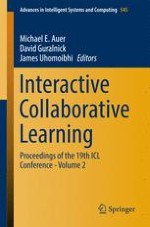2017 | OriginalPaper | Buchkapitel
A Multi-dimensional Investigation of Self-regulated Learning in a Blended Classroom Context: A Case Study on eLDa MOOC
verfasst von : Daniel F. O. Onah, Jane E. Sinclair
Erschienen in: Interactive Collaborative Learning
Aktivieren Sie unsere intelligente Suche, um passende Fachinhalte oder Patente zu finden.
Wählen Sie Textabschnitte aus um mit Künstlicher Intelligenz passenden Patente zu finden. powered by
Markieren Sie Textabschnitte, um KI-gestützt weitere passende Inhalte zu finden. powered by
